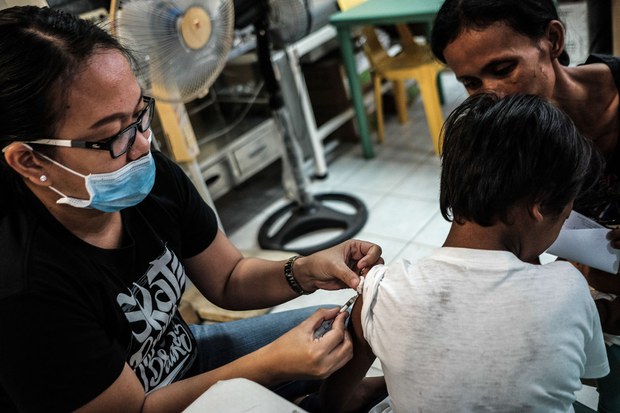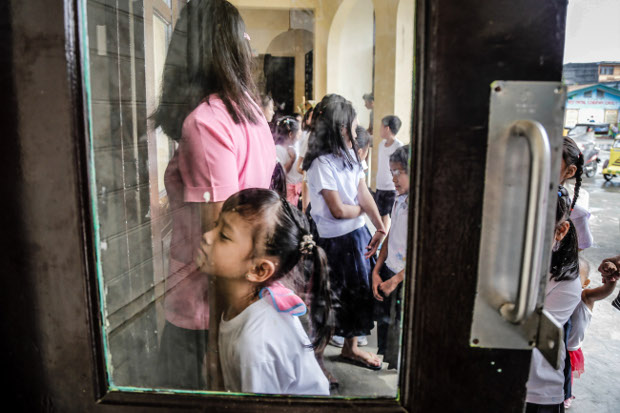Measles Outbreak Declared in Philippine Capital, Nearby Areas
2019.02.07
Manila
 A child receives an immunization at a health center in Dagupan City, in northern Luzon island, on Feb 7, 2019.
A child receives an immunization at a health center in Dagupan City, in northern Luzon island, on Feb 7, 2019.
The Philippines health department on Thursday declared an outbreak of measles in the capital Manila and nearby areas, after the disease left dozens dead.
Officials said the unusual spike in the number of deaths was due to a dengue vaccination scare in 2017 that prompted many parents to take their children out of the state immunization program.
Health Secretary Francisco Duque said 55 children, aged three months to four years old, had died of measles in an outbreak of the disease in Manila and nearby suburban areas. He attributed the deaths to “low vaccine coverage because of the Dengvaxia scare.”
“We are declaring an outbreak, as cases have increased in the past weeks and to strengthen surveillance of new cases and alert mothers and caregivers to be more vigilant,” Duque said in a statement.
The Department of Health (DOH) cited a 550 percent rise in the number of patients infected with the disease from Jan. 1 to Feb. 6, from the same period last year, and said the figure was likely to rise.
Gundo Weiler, country representative of the UN’s World Health Organization, said that officials needed to convince families to return to vaccination programs.
“We are very concerned [about] the situation because there are many cases of measles that … could have been avoided if we had achieved higher vaccination coverage,” Weiler said.
“I think it is important that we rebuild trust and pass on the message very clearly that Dengvaxia is unrelated to the very well-established vaccination programs that have been running in the country for many years and without any doubt has generated huge benefits for those who received vaccination,” he added.
Fear
In December 2017, the government announced it had suspended the Dengvaxia vaccination program, which was meant to address dengue. It also ordered a halt to the marketing and selling of Dengvaxia after the French pharmaceutical giant Sanofi Pasteur admitted those injected with it risked having severe dengue if they had no prior infections.
The Philippines, a tropical Southeast Asian country, became the first country in the region where Dengvaxia was publicly released. Then-president Benigno Aquino approved its release before he stepped down in 2016 and the vaccine was administered to children in public elementary schools.
The health department recently said that 830,000 school children aged 9 and older were given the drug, a revision from an earlier estimate of 740,000.
The DOH earlier admitted that their vaccination coverage rate had dropped to 60 percent following the controversy surrounding Dengvaxia with parents refusing to have their children vaccinated for fear that they would suffer adverse side effects.
This was largely blamed on the government’s public attorney, Persida Acosta, who said she was preparing legal action against Aquino and Duque for dozens of deaths she attributed to Dengvaxia use. But her assertions were widely criticized and later discredited by the government.
Lawmakers on Wednesday recommended the filing of criminal and administrative charges against Aquino and other officials for the Dengvaxia mess. The move was welcomed by presidential spokesman Salvador Panelo Thursday, even as he acknowledged that Acosta may have scared the public from getting immunized.
“Let the legal process take its course and those found responsible be held administratively, criminally, and civilly liable,” Panelo said.
“We reiterate the policy of the administration that whoever transgresses the law will have to account for it regardless of the social status and the political affiliation of the transgressor,” Panelo stressed.








